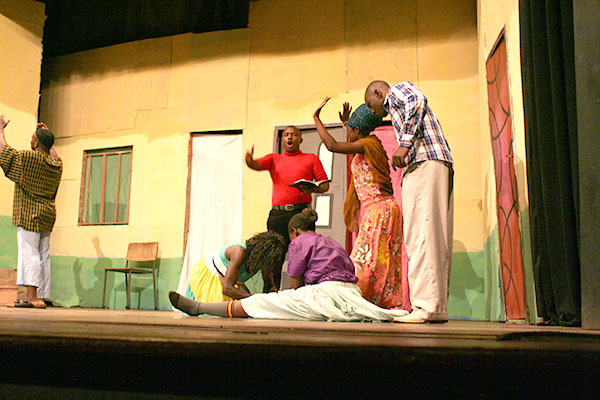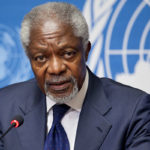
With the recent wake of terrorism and religious intolerance in the region, Pride Performers’ mawotto e’ mawotto is not only a welcome but also an educative play. After having recently watched bikambagga, another of their plays, I looked forward to an evening of great acting and comedy in one production and they did not disappoint. Running with the tag line “unity in diversity”, the play depicts a small neighborhood (boys’ quarters) that has sub divided itself along lines of religion, tribe and social status in a village called Mawotto.
Pegan families live next door to a born again pastor, a Moslem family and a traditional family (who claim to be traditional healers). All groups believe that theirs is the rightful religion and are willing to rub it in any one’s face.
With creative use of wit and humour, the play write Deo Ssebufu shows how hard it is for people with different beliefs to stay together. The Moslem family headed by Hajji (Daniel Mawanda) is in constant conflict with the neighbors who dump utensils they’ve used to cook pork at the tap. The non believers on the other hand fight with with the witch doctor’s wife who showers with suspicious looking herbs in the communal bathroom.
The play further portrays that even the different lines that we divide ourselves along are not perfect. Despite Hajji’s self righteousness, during the fasting period, he agrees to eat food served by Nusullah, (his wife)before the time for breaking the fast has reached.
The drama is turned up a notch when Nusullah, whose husband never leaves money for basic supplies at home turns into the neighborhood’s beggar. She asks for everything from soap, drinking water, to already lit pieces of charcoal. Trouble breaks out when Nandutu gives Nusullah salt on a platter which she uses to eat pork. Upon being told by the witch doctor’s wife, Nusullah tries to pour the soup because she is afraid of what Hajji will say. He however says there is no need to pour the soup. He asks his neighbours that they need to learn to live with each other. However despite his apparent liberalism, Hajji beats up any one who under looks Islam or can’t return Islamic greeting, clearly depicting the religious intolerance witnessed in some parts of the world.
Though the national theatre auditorium was not packed to capacity last Sunday,the actors give it their best bringing this strange collection of characters which clearly sets them apart as actors.
Though given less dialogue, Francis Makumbi (who acts ‘boy’) is one of the most comedic characters in the play. His mere appearance on stage gets the audience excited. The school boy uniform on his burly frame is enough to crack the audience up. He is the audience’s favorite.

I personally was impressed by Daniel Mawanda’s portrayal of a staunch Moslem man. He not only relies on Islamic dress code but also has a fairly good command of Arabic terminologies. He really puts himself into character.
The play write however sacrifices the audience’s comprehension of the play for comedy by including a Gishu family which was displaced due to the Bududa landslides. While their high-pitched voices and sibilant speech spoken with accents typical of the Bagishu people are great comedy relief, one has to strain their ears and mind so as to follow the dialogue on stage. Either the play write stretched the comedy too far or the two actors had a little too much fun and forgot that their primary role is to communicate. Though extremely annoying, Nandutu who is bitten by a snake becomes the uniting factor in the play. It is after she is bitten by a snake that the entire neighborhood comes together to save her. The pastor goes to one corner to pray, Hajji prostrates himself on the floor while the witch doctor shakes his Ensaasi over Nandutu’s body. It is quite amusing when each of them claims to have been the one who saved her life. This is the point that the play writer’s message of unity despite our differences is clearly portrayed.
If you can not understand Luganda, most of the scenes from the play are just a series of incomprehensible actions because it basically is the only language used.
It however goes without saying that great theatre is dying on stage with nobody watching it. The small number of people who were present for this play is evidence of that.








https://antarvasna-3.com/antarvasna-3-com/vid?os-porno/3 bbw asiatique – 3 bbw asiatique